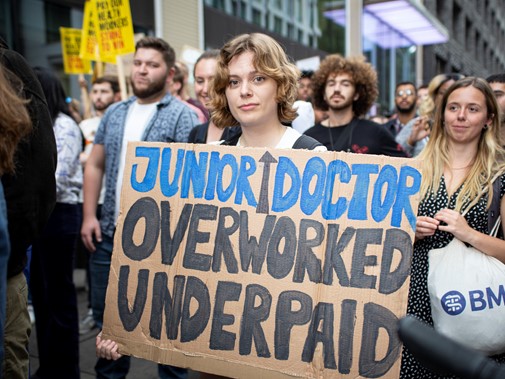This is from NHS England:
The BMA and HCSA have announced junior doctors strikes running from 6:59am on Tuesday 11 April until 6:59am on Saturday 15 April. This is four days of strikes involving up to half of doctors in the NHS coming immediately after a 4 day bank holiday weekend. The NHS is facing record demand and the long bank holiday weekend is usually one of the busiest times for the NHS with staff working incredibly hard to maintain services.
The NHS is working hard to prioritise resources to protect emergency treatment, critical care, neonatal care, maternity, and trauma, and ensure we prioritise patients who have waited the longest for elective care and cancer surgery. We will only reschedule appointments and procedures where necessary and will rebook immediately, where possible. Unfortunately these strikes will have a significant impact upon planned and routine care.
The NHS is asking patients to choose services appropriately during industrial action and take simple steps to help ensure care is available to patients who need it most. This includes using 111 online as the first port of call for health needs, and only using 999 if it is a life-threatening emergency.
If we have not contacted you, please attend your appointment as planned. The NHS will contact you if your appointment needs to be rescheduled due to strike action.
GP practices will continue to be open during the junior doctors strike. Please continue to attend your GP and dental appointments, unless you are contacted and told otherwise.
For more information on when to call 999 and when to go to A&E, you can visit the NHS UK website.
Ahead of the bank holiday weekend, the advice for anyone that is travelling to other areas is to:
- Make sure you have ordered and collected any repeat medicines, especially if you are travelling
- Remember that your first port of call for GP care is your home practice, which will be able to provide online, phone and video consultations as well as arranging for prescriptions to be sent to any pharmacy you choose.
Junior doctors make up around half of all doctors in the NHS. Junior doctors are qualified doctors who have anywhere up to eight year’s experience working as a hospital doctor, depending on their specialty, or up to three years in general practice.
We are now entering the fifth month of industrial action across the NHS, this has a cumulative impact on staff who have gone above and beyond to maintain safe patient services during a challenging period.
Previous action by junior doctors saw approx. 28k staff off due to industrial action. These strikes also come at a time when large numbers of other frontline staff are on annual leave due to school holidays.
Previous industrial action by junior doctors over three days saw 175,000 hospital appointments disrupted. As these strikes are over a longer period and coming during the holiday period we would expect a significantly greater number of appointments to be impacted, this is likely to include some cancer care.
Regardless of any strike action taking place, it is really important that patients who need urgent medical care continue to come forward as normal, especially in emergency and life-threatening cases – when someone is seriously ill or injured, or their life is at risk.
If you need medical help or advice, or you are unsure about whether you should go to hospital, go to NHS 111 online unless it is a life-threatening emergency when you should still call 999.
Patients should take advice from 111 / 999 call-handlers on whether there are circumstances where it is suitable for them to make their own way to hospital. During strike days, it is likely 999 call handlers will be very busy. NHS 111 call centres will have fewer staff, with longer call response times expected across the system. As a result, we are urging anyone with non-urgent care need to first seek help from NHS 111 online.
The NHS is also asking the public to play their part by taking simple steps during industrial action to look after themselves, loved ones and checking in on vulnerable family members and neighbours.
Frequently asked questions
What is happening?
Trade unions representing some NHS staff are in dispute with the Government over the 2022/23 pay award. A number of the unions have balloted their NHS members to take part in industrial action. As a result, members of the following unions are striking on the dates listed below:
- 11 April – BMA junior doctors from 0700
- 12 April – BMA junior doctors (full 24 hours)
- 13 April – BMA junior doctors (full 24 hours)
- 14 April – BMA junior doctors (full 24 hours)
- 15 April – BMA junior doctors until 0700
What do strikes mean for NHS services in my area?
Not every hospital and ambulance service will be affected by strike action. You can check which trusts are affected on each trade union’s website:
- GMB
- Royal College of Nursing
- Chartered Society of Physiotherapy
- Unite
- UNISON
- Hospital Consultants and Specialists Association (HCSA)
- British Medical Association (BMA)
- British Dental Association (BDA)
What if I need urgent or emergency care?
Anyone who needs urgent care should use NHS111 online to be assessed and directed to the right care for them. If you do not have internet access then 111 helpline is available. When someone is seriously ill or injured and their life is at risk, you should seek emergency care in the normal way, by calling 999.
Can the NHS provide safe services during strikes?
The NHS is working hard to minimise the risk to patient safety. This means we will prioritise resources to protect emergency treatment, critical care, neonatal care, maternity, and trauma, and ensure we prioritise patients who have waited the longest for elective care and cancer surgery. We will only reschedule appointments and procedures where it is necessary and will rebook immediately, where possible. Unfortunately these strikes will have a significant impact upon planned and routine care.
If staff are out on strike what does it mean for emergency care?
In advance of strike action, we work with unions to agree which members of staff can continue to work to ensure safe levels of care. These agreements are called derogations and often mean that some health union members will continue their work in line with an agreement between employers and unions. Where derogations have not been agreed we may have to move staff from other departments within a hospital to ensure we can continue to provide emergency care. Unfortunately, this could mean disruption to some routine appointments and procedures.
What will this mean for appointments?
During strike action we will prioritise emergency treatment and patients seeking urgent treatment will be seen. Unfortunately, this means we may have to prioritise emergency care over some routine appointments and procedures. Everyone who has an appointment should attend as planned, unless your local NHS provider has contacted you to reschedule. If we have not contacted you, please attend your appointment even if your Trust is affected by strikes.
Will emergency care be affected on strike days?
Emergency care will continue to be available across all parts of the country. It is really important that in emergency and life-threatening cases – when someone is seriously ill or their life is at risk patients continue to come forward as normal.
When will I find out if my appointment is rescheduled?
The NHS will contact you if your appointment needs to be rescheduled due to strike action. This is likely to be a text, phone call or a letter, and you should be offered an alternative date for your appointment. If we have not contacted you, please attend your appointment as planned.
If my appointment is rescheduled, will I be put back to the bottom of the waiting list?
Any appointments that need to be rescheduled will be done so as a priority.
Should I cancel my appointment on the day of strikes?
No, if we have not contacted you, please attend your appointment as planned.
Is there anything I should do now?
To avoid delays in getting your medicines or the risk of running out of medicines during strikes please order prescriptions in good time.
I have a loved one who will be a hospital inpatient on strike day – how will their care be affected?
All hospital inpatients will be informed of how their care will be impacted on a ward-by-ward basis by the staff involved in delivering their care.
What should I do if I need an ambulance?
Patients should only call 999 if seriously ill or injured, and there is risk to life. Ambulances will be dispatched where clinically appropriate.
For all other health care needs support will be available through NHS111 online (if you do not have internet access then 111 helpline is available) or at your local GP or pharmacy.
Will GP services be affected on strike days?
Junior doctors strikes may impact some appointments. Please continue to attend your GP appointments, unless you are contacted and told otherwise.
Will dentists be impacted?
The British Dental Association has advised that some of their members who work in hospitals on trainee contracts will take action on the same days as junior doctors. However the vast majority of dentists will continue to work. Please continue to attend any dental appointments unless you are contacted and told otherwise.
What is considered an emergency?
Patients should only call 999 if seriously ill or injured, and there is risk to life. Ambulances will be dispatched where clinically appropriate.
How long will services be impacted?
The junior doctors strikes by members of the British Medical Association, BDA and HCSA will last for 96 hours.


